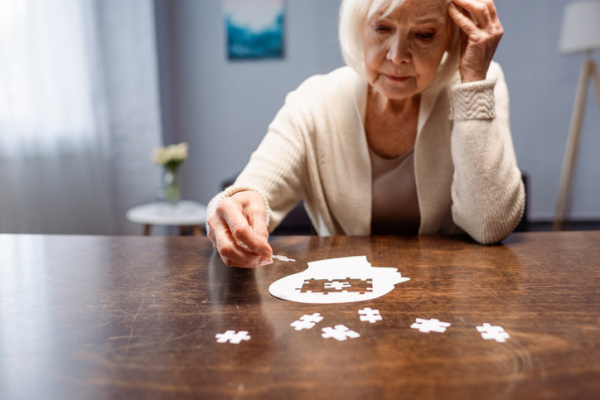
Did you know that of the 6.2 million people with Alzheimer’s disease who are age 65 or older in this country, almost two-thirds are women? This means that Alzheimer’s disease is almost twice as common in women compared to men. Why is Alzheimer’s disease more common in women?
Women live longer
The first and most important reason is that women tend to live longer than men. If you look at actuarial life tables, you can see that a baby girl born in 2019 is likely to live five years longer than a baby boy: 81 versus 76 years.
The greatest risk factor for Alzheimer’s disease is age: the older you are, the more likely you are to develop Alzheimer’s disease. For example, out of 1,000 people, the incidence (the number who develop Alzheimer’s each year) depends on age:
- 4 out of 1,000 people ages 65 to 74 develop Alzheimer’s each year
- 32 out of 1,000 people ages 75 to 84 develop Alzheimer’s each year
- 76 out of 1,000 people ages 85 and older develop Alzheimer’s each year.
So, one reason that there are more women with Alzheimer’s disease than men is simply that there are more older women than older men living in our society — 5.7 million more of them — and the older you are, the more likely you are to develop Alzheimer’s disease.
But that’s not the whole answer.
The incidence of Alzheimer’s is greater in women
Your chances of developing Alzheimer’s disease late in life are somewhat greater if you are a woman than a man. One study followed 16,926 people in Sweden and found that, beginning around age 80, women were more likely to be diagnosed with Alzheimer’s disease than men of the same age. Similarly, a study based in Taiwan found that one’s chances of developing Alzheimer’s disease over seven years was greater in women compared to men. And a meta-analysis examining the incidence of Alzheimer’s disease in Europe found that approximately 13 women out of 1,000 developed Alzheimer’s each year, compared to only seven men.
So, women living longer than men cannot be the whole answer as to why women are more likely than men to develop Alzheimer’s disease, because even among individuals who are living and the same age, women are more likely to be diagnosed with Alzheimer’s than men.
The incidence of non-Alzheimer’s dementia is not greater in women
One clue to the answer to this puzzle is that your chances of developing dementia from a cause other than Alzheimer’s disease is not greater if you are a woman. For example, the study examining dementia rates in Sweden found that both women and men were equally likely to develop a non-Alzheimer’s dementia as they aged. That rates of Alzheimer’s disease differ by gender, whereas rates of non-Alzheimer’s dementias do not, suggests that there must be a specific interaction between Alzheimer’s disease and gender.
Amyloid deposition in Alzheimer’s may be fighting infections
Another clue to this puzzle comes from the work of Harvard researchers, who have suggested that amyloid, one component of Alzheimer’s disease pathology, may be deposited in order to fight off infections in the brain. If their suggestion turns out to be correct, we might think of Alzheimer’s disease as a byproduct of our brain’s immune system.
Autoimmune disorders are more common in women
The last piece of the puzzle is that women are about twice as likely to have an autoimmune disease compared to men. The reason for this difference is not entirely clear, but it is clear that the immune system is generally stronger in women than men, and many autoimmune diseases are more common during pregnancy. It may be that women’s stronger immune system developed through evolution to protect the fetus from infections. So, as part of their stronger immune systems, women may end up having more amyloid plaques than men.
Putting the pieces together
By combining all of this information, one possible explanation as to why women’s risk of Alzheimer’s disease is greater than men’s — in addition to women living longer — is:
- The amyloid plaques that cause Alzheimer’s disease may be part of the brain’s immune system to fight against infections.
- Women have stronger immune systems than men.
- As part of their stronger immune systems, women may end up having more amyloid plaques than men.
- Because they may have more amyloid plaques than men, this theory may explain why women end up having a greater risk of developing Alzheimer’s disease.
Please note the italicized words "may" that I have used. Although the ideas I have presented here are logical, coherent, and form the basis of a good theory, they have not yet been proven to be correct. More research is needed!
The bottom line
You are more likely to develop Alzheimer’s disease over your lifetime if you are a woman, because women live longer than men and, possibly, because women have stronger immune systems compared to men.
Does that mean that if you’re a woman, you’re more likely to develop Alzheimer’s disease and there’s nothing you can do about it? Not at all! You can do many things to reduce your risk of Alzheimer’s today.
- Engage in aerobic exercise such as brisk walking, jogging, biking, swimming, or aerobic classes at least 30 minutes per day, five days per week.
- Eat a Mediterranean menu of foods including fish, olive oil, avocados, fruits, vegetables, nuts, beans, whole grains, and poultry. Eat other foods sparingly.
- Sleep well — and clean those Alzheimer’s plaques out of your brain.
- Participate in social activities and novel, cognitively stimulating activities.


